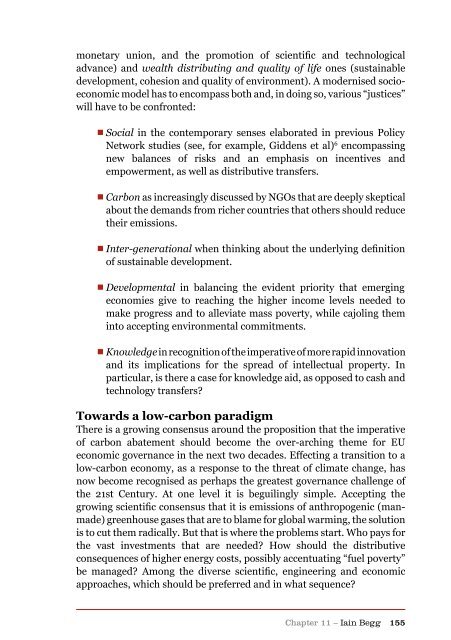Authors Iain Begg | Gabriel Glöckler | Anke Hassel ... - The Europaeum
Authors Iain Begg | Gabriel Glöckler | Anke Hassel ... - The Europaeum
Authors Iain Begg | Gabriel Glöckler | Anke Hassel ... - The Europaeum
Create successful ePaper yourself
Turn your PDF publications into a flip-book with our unique Google optimized e-Paper software.
monetary union, and the promotion of scientific and technological<br />
advance) and wealth distributing and quality of life ones (sustainable<br />
development, cohesion and quality of environment). A modernised socioeconomic<br />
model has to encompass both and, in doing so, various “justices”<br />
will have to be confronted:<br />
n Social in the contemporary senses elaborated in previous Policy<br />
Network studies (see, for example, Giddens et al) 6 encompassing<br />
new balances of risks and an emphasis on incentives and<br />
empowerment, as well as distributive transfers.<br />
n Carbon as increasingly discussed by NGOs that are deeply skeptical<br />
about the demands from richer countries that others should reduce<br />
their emissions.<br />
n Inter-generational when thinking about the underlying definition<br />
of sustainable development.<br />
n Developmental in balancing the evident priority that emerging<br />
economies give to reaching the higher income levels needed to<br />
make progress and to alleviate mass poverty, while cajoling them<br />
into accepting environmental commitments.<br />
n Knowledge in recognition of the imperative of more rapid innovation<br />
and its implications for the spread of intellectual property. In<br />
particular, is there a case for knowledge aid, as opposed to cash and<br />
technology transfers?<br />
Towards a low-carbon paradigm<br />
<strong>The</strong>re is a growing consensus around the proposition that the imperative<br />
of carbon abatement should become the over-arching theme for EU<br />
economic governance in the next two decades. Effecting a transition to a<br />
low-carbon economy, as a response to the threat of climate change, has<br />
now become recognised as perhaps the greatest governance challenge of<br />
the 21st Century. At one level it is beguilingly simple. Accepting the<br />
growing scientific consensus that it is emissions of anthropogenic (manmade)<br />
greenhouse gases that are to blame for global warming, the solution<br />
is to cut them radically. But that is where the problems start. Who pays for<br />
the vast investments that are needed? How should the distributive<br />
consequences of higher energy costs, possibly accentuating “fuel poverty”<br />
be managed? Among the diverse scientific, engineering and economic<br />
approaches, which should be preferred and in what sequence?<br />
Chapter 11 – <strong>Iain</strong> <strong>Begg</strong> 155

















